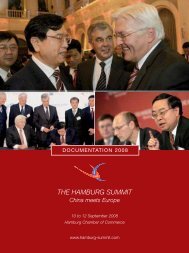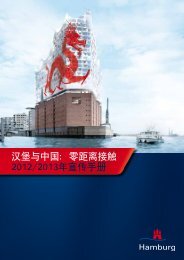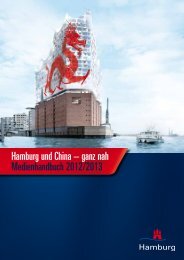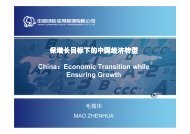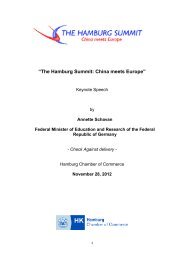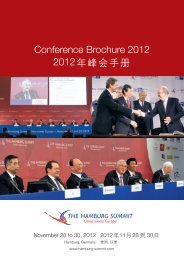Documentation Brochure - Hamburg Summit
Documentation Brochure - Hamburg Summit
Documentation Brochure - Hamburg Summit
- No tags were found...
You also want an ePaper? Increase the reach of your titles
YUMPU automatically turns print PDFs into web optimized ePapers that Google loves.
Asia in 2015 – Scenarios<br />
Richard Hausmann, Siemens, and Eberhard Sandschneider, German Council on Foreign Relations, outlined their views an Asia´s future<br />
Forecasting the future is difficult,<br />
all the panel-speakers agreed. But<br />
Richard Hausmann, President of Siemens<br />
China, risked three theses, the first<br />
of which most impressively reaffirmed<br />
the <strong>Summit</strong>’s basic tenor. Economically,<br />
he said, the twenty-first century might<br />
not be Asian, but Asia would play a significant<br />
role. “We will have to make<br />
room for China and India,” he said. And<br />
he left no doubt that “it is something<br />
that will not only happen but also need<br />
to happen because otherwise China will<br />
face big social problems.”<br />
It will be accompanied by powerful<br />
economic changes in the two up and<br />
coming Asian countries. “India and China,<br />
those two mega-countries, will no<br />
longer be the workshop of the world,<br />
they will shift to innovation. That is a<br />
clear goal of the Chinese government,”<br />
Hausmann said. Last not least, both<br />
countries would play a more important<br />
role in world affairs. “I am more on the<br />
optimistic side,” he concluded, “that<br />
growth will go on at least until 2015.”<br />
Although Professor Eberhard Sandschneider<br />
of the German Council on Foreign<br />
Relations agreed with this scenario<br />
he was unable to share the previous<br />
speaker’s optimism. Yes, he said, the<br />
twenty-first century would be a global<br />
world with a strong Asian pole, and the<br />
basis of power would be innovation and<br />
not the army. But the biggest risk would<br />
be to manage stability in the world, “and<br />
therefore I have some doubts about a linear<br />
development.” China was so big<br />
and all options were open. “Whatever<br />
you want to see,” he said, “I will show it<br />
to you.” The West had long ceased to<br />
serve as a model. Gone were the days<br />
when the free market economy and democracy<br />
had been a blueprint for the<br />
world. “In Asia,” Sandschneider said,<br />
“self-confidence is growing faster than<br />
the economy.” Europe was now no more<br />
than a museum. Theo Sommer, editor-at-large<br />
of the German weekly Die<br />
Zeit, underscored this position with a<br />
few sober figures. In 1900 the Europeans<br />
were still 20% of the world’s population.<br />
Today they made up a mere 11%<br />
and in 2015 they would be barely 7%.<br />
“We seem to be a vanishing race,” Sommer<br />
said.<br />
Europe already has a problem today,<br />
the speakers agreed. It has no coordinated<br />
policy to Asia. “China recognises<br />
Europe as an economic power but not<br />
as a political power”, Hausmann said.<br />
And Europe has lost its political innocence<br />
as well as the US. “If we push these<br />
countries to human rights we should<br />
protect them at first”, Professor Sandschneider<br />
noticed.<br />
For all the growing self-assurance<br />
there are some Chinese, like Zhang Yue,<br />
Chairman of Broad Air Conditioning,<br />
who lament the consequences of growing<br />
prosperity, and not just on account<br />
of the serious ecological and social<br />
problems. “People have become very<br />
materialistic,” he complained. “We are a<br />
country of materialists.” People used to<br />
read a book and be happy. Today, under<br />
growing Western influence, he said, “we<br />
consume so we are happy.”



